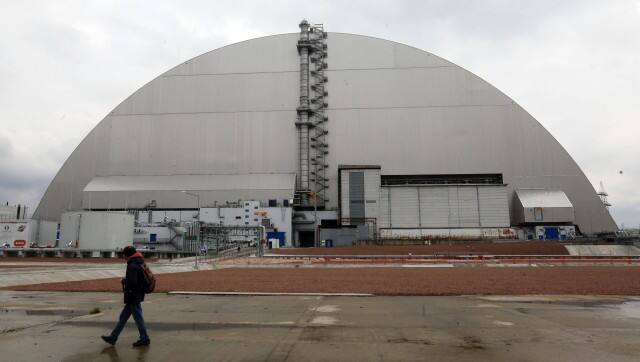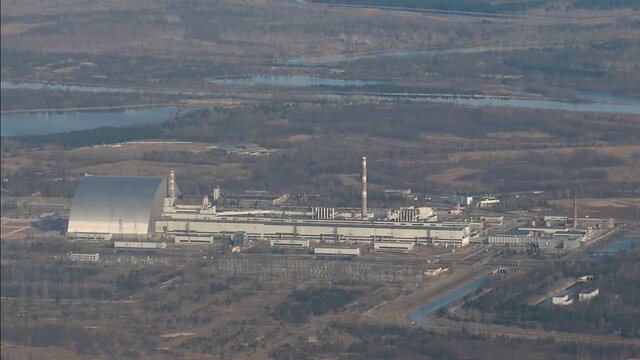When fighting from Russia’s invasion of Ukraine resulted in power cuts to the critical cooling system at the closed Chernobyl nuclear power plant, some feared that spent nuclear fuel would overheat. But nuclear experts say there’s no imminent danger because time and physics are on safety’s side. Because the fuel rods have been cooling for more than 20 years already, it is not a situation like the 2011 Fukushima nuclear disaster or even like the original Chernobyl meltdown nearly 36 years ago, several nuclear energy experts told The Associated Press. The International Atomic Energy Agency also said it “sees no critical impact on safety” at the plant, which was the site of the world’s worst nuclear accident in April 1986. WHAT HAPPENED IN RECENT DAYS AT CHERNOBYL? Ukrainian electrical grid operator Ukrenerho said power was cut to all Chernobyl facilities and the diesel generators have fuel for 48 hours. Without power, the “parameters of nuclear and radiation safety” cannot be controlled, it said. Ukrainian Foreign Minister Dmytro Kuleba said the plant, which was occupied by Russian forces earlier in the 24 February invasion, “lost all electric supply,” and he called on the international community “to urgently demand Russia to cease fire and allow repair units to restore power supply.” French government spokesman Gabriel Attal underscored that Russian leader Vladimir Putin had “committed to guarantee the security and safety of nuclear sites in Ukraine” in his phone call with French President Emmanuel Macron on Sunday. WHAT WAS THE BIGGEST FEAR IN THE LATEST CRISIS? The Chernobyl plant, which closed in 2000, has fuel rods containing 230 kilograms (500 pounds) of uranium, and they are submerged in water at least 15 meters (49 feet) deep, with an active cooling system, said Frank von Hippel, a Princeton University physicist who co-founded the Program on Science and Global Security. The general worry was that the power outage would cause the cooling system’s backup generators to stop, the radioactive fuel rods would heat up and boil away the water that also helps cool them, raising the temperature to 800 degrees Celsius (1,470 degrees Fahrenheit), and causing a fire. But that’s “pretty unlikely in the situation because the fuel is so cool,” said Edwin Lyman, nuclear power safety director at the Union of Concerned Scientists. Even that improbable worst-case scenario it would take “weeks to months” for the 2,000 fuel assembly pieces in the Chernobyl deep water pool to boil away, added von Hippel. Such heating would be “very slow-moving, if it ever gets there,” he said, calculating that it would take “about 40 days for the pool to dry out.” In normal circumstances, cooling fuel rods lose a massive amount of energy and radioactivity — by a factor of 10 — every seven days, said Patrick Regan, nuclear physics professor at the University of Surrey. He said the current scenario wasn’t like the 1986 Chernobyl meltdown or the disaster at the Fukushima plant with fuel rods so fresh and hot “that you need to keep water flowing through continually.” After the Fukushima disaster, which was caused by an earthquake and tsunami, the Ukrainian government commissioned a study to look at the meltdown potential from power loss to the cooling of rods. The study found that it wouldn’t be possible for the cooling water to reach boiling temperature and the fuel rods would not be uncovered to start a real meltdown, Lyman said. THE PHYSICS OF COOLING FUEL RODS [caption id=“attachment_10446111” align=“alignnone” width=“640”]  On 26 April, 1986, a reactor at the Chernobyl nuclear power plant exploded, leading to an explosion and the subsequent fire spewed a radioactive plume over much of northern Europe. AP[/caption] When fuel rods are spent after generating power, they still have lots of internal radioactivity and are still hot. Internal radioactive decay gives off heat and remains in the fuel rods for tens of thousands of years, so they can get hotter unless something is done to cool them, Regan said. The rods are put in cooling pools or ponds where both water and an active electric-powered system cools them with a heat exchange pump. “As soon as you stop the coolant, as soon as you stop the mechanism for taking the heat off, it (temperature) will increase,” Regan said. Eventually in most plants, the radioactivity and heat subsides enough that it could eventually switch from water cooling to air cooling. NO IMMEDIATE DANGER SEEN The Swedish Radiation Safety Authority estimates that a power outage at Chernobyl will not lead to any radiological emissions in the next couple weeks. “The fuel storage ponds are also very deep and would likely take weeks for the water to boil down, even without cooling pumps active. This should hopefully allow enough time for the power to cooling systems to be restored,” said Mark Wenman, a nuclear energy expert at Imperial College London. The IAEA, which is the UN nuclear watchdog based in Vienna, said it saw no critical impact on safety at Chernobyl because there could be “effective heat removal without need for electrical supply” from spent nuclear fuel at the site. Lyman and others said they were more concerned about potential damage to cooling systems and other problems at Ukraine’s four other operating nuclear power plants, rather than at the defunct Chernobyl site. In 2017, Chernobyl got a new 2 billion euro containment system to go over the old sarcophagus. OTHER CONCERNS The post-Fukushima study did raise issues about hydrogen gas being generated and pooling from the cooling process, which is removed with an electronic system, Lyman said. The concern is that the explosive gas may pool more without the venting system and lead to dangers, including sparks when electricity is turned back on if it ever stops. Another issue is that lack of electricity means the IAEA’s monitoring system, for safety and security, will be blinded, Lyman said. “It’s not just the cooling to the pools, but all the off-site radiation monitoring systems have been lost,” Lyman said. “The IAEA doesn’t have cameras anymore.” He described the overall situation as not good, but said it isn’t an immediate emergency. There are layers of safety that help, but the lack of power peels some of those away. “It’s limping along with kind of less resilience,” Lyman said. “So if something else does happen, there’s less margin.” Given that experts say a major radioactive release is weeks to months away, if at all, the biggest consequence of the power shutoff or targeting of nuclear plants in the war is fear, said Emma Claire Foley, a policy researcher on US-Russian nuclear policy. “People hear ‘Chernobyl’ and think ’nuclear disaster,’” Foley said. “It does cause fear. And it does cause a sense of uncertainty.” If anything bad did happen, Ukraine’s neighbor of Belarus, a Russian ally, “would need to be more concerned than anyone else” because of its proximity to the Chernobyl site, said University of Southern California nuclear engineering professor Najmedin Meshkati. The Belarus border is less than 10 miles from Chernobyl, while the Ukrainian capital of Kyiv is about 130 kilometers (80 miles) south of the plant, “Belarus got the brunt of the Chernobyl impact” from the radioactive cloud released in 1986, he said, adding that Belarus President Alexander Lukashenko should “take the lead in begging Mr. Putin to stop military operations around Chernobyl.” Read all the Latest News , Trending News , Cricket News , Bollywood News , India News and Entertainment News here. Follow us on Facebook, Twitter and Instagram.
The International Atomic Energy Agency has said it “sees no critical impact on safety” at the plant, which was the site of the world’s worst nuclear accident in April 1986.
Advertisement
End of Article


)

)
)
)
)
)
)
)
)



